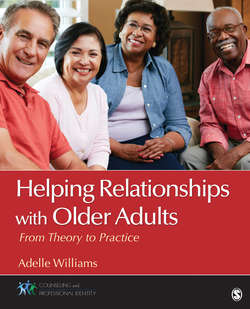Читать книгу Helping Relationships With Older Adults - Adelle M. Williams - Страница 81
На сайте Литреса книга снята с продажи.
Leisure Activities
ОглавлениеParticipation in challenging programs has a positive effect on physical health, mental health, and social functioning in older adults. Cognitively fit older adults benefit from participation in leisure activities. Among cognitive activities, reading, playing board games, and playing musical instruments were associated with a lower risk of dementia.
Dancing is the only physical activity associated with a lower risk of dementia (Verghese et al., 2003). Senior participants in a Dancing Heart program reported better health, stating that the dance and movement improvisation activities improved their flexibility, coordination, balance, and endurance, and the shared reminiscence and discussion increased their memory and socialization skills (Tabourne & Lee, 2005–2006). Researchers found that long-term social dancing may be associated with better balance and gait in older adults (Verghese, 2006), and dancers reported slightly more improvement in sleep, mood, and the ability to participate in hobbies, do housework, and have sex than the others.
Playing music, specifically taking group keyboard lessons, was found to increase human growth hormone (hGH) levels. Growth hormone levels decline during aging and contribute to unwelcomed effects of aging (Clements, 2010). Low hGH is implicated in such aging phenomena as osteoporosis, energy levels, wrinkling, sexual function, muscle mass, and aches and pains while controlling for differences in life events and social support. Boyer (2007) found that participants in music classes also showed a decrease in anxiety, depression, and perception of loneliness.
Participating in the arts improves older adults’ quality of life as well, particularly for those who suffer from dementia. Participation in weekly sessions focused on objective and subjective indicators of affect, and self-esteem contributed to each individual’s sense of well-being (Rentz, 2002). An increase in quality of life was measured following music performances and wall murals, which can be effective for cueing residents away from situations that may evoke agitation as well as potential harm and litigation (Kincaid & Peacock, 2003). In older adults without dementia, creating visual art was found to alleviate boredom, loneliness, helplessness, and distraction from physical pain and stimulated cognitive faculties (National Assembly of State Arts Agencies, 2005).
Research into the effects of exercising the body, mind, and social ability proves promising. Healthy adults who received 10 memory training sessions, reasoning training, and speed training did better than the control group (Willis et al., 2006). Researchers found that fitness training may also improve some mental processes, and physical exercise might slow the effects of aging and help people maintain cognitive abilities well into older age (Kramer, Colcombe, Erickson, & Paige, 2006). Such positive effects of leisure activities prove the importance of encouraging all older adults participate in them.
